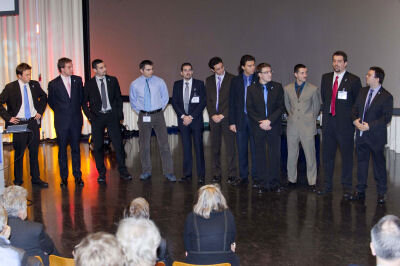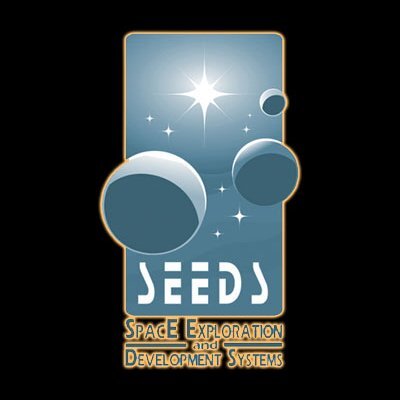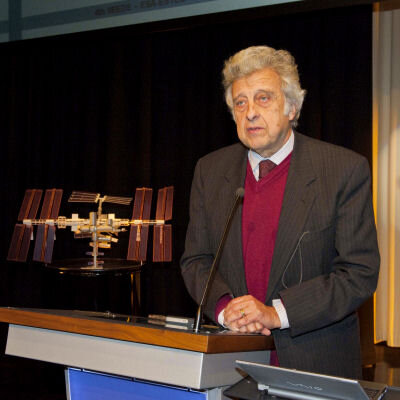The 4th SEEDS International Master Course - Student Graduation Ceremony
On 15 December, graduates of the fourth International Master Course in ’SpacE Exploration and Development Systems’,called SEEDS, presented the results of their final team project in the Erasmus Centre Auditorium at ESA’s European Space Research and Technology Centre in the Netherlands. The project focused on the subject of ‘Advanced Lunar Itinerant Caravan for Exploration’.
The SEEDS graduation ceremony started with a presentation on the activities of the ESA Directorate of Human Spaceflight and Exploration given by Sylvie Espinasse, Administrator, Transportation and Human Exploration Department. Afterwards, Professor Ernesto Vallerani, the SEEDS Educational Project Manager, as well as other professors from the University of Bremen and the Grande Ecole Aérospatiale Supaero in Toulouse, recalled the past four years of SEEDS activities and introduced the fourth graduation class project.

During the ceremony, P. Messidoro, an engineer from Thales Alenia Space, commented on the successful contribution from Thales Alenia to the SEEDS programme. Finally, the students presented the SEEDS 08/09 project work on the ‘Advanced Lunar Itinerant Caravan for Exploration’ (ALICE).
“ALICE” provides a detailed description of six sub-systems:
- Lunar Surface Segment
- Pressurized Laboratory/Supply Trailer
- Robotic Bay
- Mobile Nuclear Power Plant
- Lunar Satellites Constellation
- Sample Return Vehicle.
Thanks to their presentation, some of the experts attending the ceremony discovered a number of novel and interesting issues particularly relevant to exploration life support systems.
The graduation ceremony ended with the awarding of SEEDS certificates, entailing the start of a new stage in the professional development of the SEEDS graduates. The SEEDS Master Course has helped experts to gain an insight into system engineering activities and to develop a professional capability for solving engineering problems in a practical way. Now the time has come for them to start being part of the real industrial system-engineering world related to the challenging and fascinating domain of Human Spaceflight and Exploration.
About SEEDS

The SEEDS post graduate MSc course is a 15-month programme organised by three leading European aerospace universities: the Politecnico of Turin, in Italy, the University of Bremen, in Germany, and the Grande Ecole Aérospatiale Supaero in Toulouse, France. All three universities are based in cities that host space industries and research centres, and have a long-standing tradition of cooperation in space. This guarantees the support and contribution of high-level experts and strong links with space industry and agencies.
As part of the programme, students attend preparatory courses on ‘Understanding Space: Introduction to Space Basic Concepts’ and on ‘Learning about Space Systems: fundamentals of Space Engineering’, and perform an intensive activity of Preliminary Design while engaged in a 6-month project conducted in Toulouse, Bremen and Turin.

The SEEDS course differs from other MSc and post-MSc space programmes in that it focuses on the design habitable systems for space exploration. It aims to prepare the future workforce needed by the European space industry with a special focus on system engineering of space exploration programmes. During the last three years, the SEEDS course has been endorsed by ESA, the Italian space agency (ASI), the French space agency (CNES), the German Aerospace Centre (DLR), Thales Alenia Space, Astrium, OHB Systems and other companies from the European space industry. Thales Alenia Space plays a leading role in defining the academic curriculum of the course.
Today, ESA’s Directorate of Human Spaceflight is actively defining its role in the International Space Exploration Initiative. This is why having system engineers for human space exploration trained through the SEEDS programme is an excellent investment for the future of Europe. Twenty-two out of the 25 graduates from the four sessions of the SEEDS programme are already working within European space industry, including in the field of Human Spaceflight and Exploration.
Further information is available on the European SEEDS website with links to each university’s individual programme: http://www.seeds-master.eu




